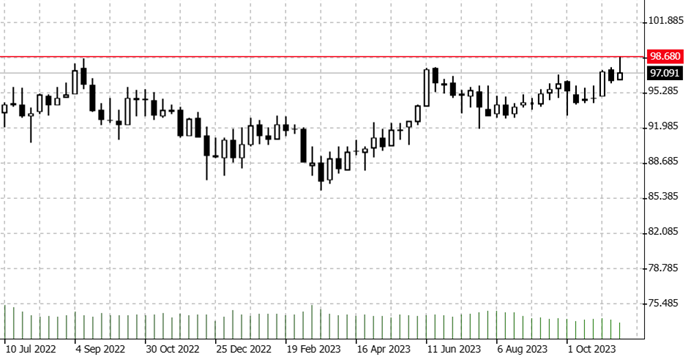

17.11.2023 – Some people like to suffer, it’s called masochism. Whether the Bank of Japan’s self-mortification will continue for much longer is questionable – because the yen has recently depreciated so much that the question of intervention or a change in the exchange rate is once again on the table.
The fact is that the globally unique zero interest rate policy on the Nippon is hollowing out the yen. The Japanese currency is steadily losing value, especially against commodity-based currencies such as the Australian dollar. We recently saw a strong upward impulse movement on the weekly chart, which was only briefly halted. The red resistance could soon be tested again.

Source: Bernstein Bank GmbH
The decline looks similar for other currencies. This reminded us of an analysis by the private bank Metzler, which advised some time ago to pay close attention to such rapid changes. In both the currency and bond markets, the central bank and the government must be careful not to let the situation slip.
Momentum is what counts
And Metzler continued under the title “The Bank of Japan’s pressure of suffering is increasing”: “The BoJ has repeatedly stated that it is not analyzing the absolute levels of exchange rates critically, but rather the speed of exchange rate changes. Therefore, it ultimately depends on the momentum whether we will really see yen-strengthening market interventions or whether it will remain verbal interventions.”
Impending national bankruptcy
The facts are well known: The Bank of Japan is pumping massive liquidity into the bond market on a daily basis to prevent a crash in government bonds. That would be national bankruptcy – because the BOJ holds more than half of the outstanding Japanese bonds. The ingenious financial blog “ZeroHedge” recently called the yen the “Japanese lira” with a cross-reference to Turkey. Unfortunately, the bond support is not causing the yen to plunge – but inflation to rise.
Other augurs commented along the same lines. The blog “SchiffGold” recently warned of a “Disaster Guaranteed To Happen” – in Japan, a train crash is happening in slow motion. Japan’s national debt is the equivalent of 9 trillion dollars, or 200 percent of gross domestic product. Interest payments alone account for around a quarter of government spending. And that with extremely low interest rates. If they were to rise to 4 percent, expenditure on interest would be higher than the entire national budget. Let us remind you that interest rates in the rest of the world are even higher, which means that investors are buying bonds in the USA or Europe and not in Japan.
Possible turnaround
But we should not declare the yen bulls dead – because the dead live longer. Some time ago, the Bloomberg news agency stated that the Bank of Japan had far greater potential for surprise interest rate hikes than its colleagues in Frankfurt or Washington D.C. With this in mind, keep an eye on the real-time news – Bernstein Bank wishes you successful trades and investments!
_________________________________________________________________________________________________________________________________
The content of this publication is for general information purposes only. In this context, it is neither an individual investment recommendation or advice nor an offer to purchase or sell securities or other financial products. The content in question and all the information contained therein do not in any way replace individual investor- or investment-oriented advice. No reliable forecast or indication for the future is possible with respect to any presentation or information on the present or past performance of the relevant underlying assets. All information and data presented in this publication are based on reliable sources. However, Bernstein Bank does not guarantee that the information and data contained in this publication is up-to-date, correct and complete. Securities traded on the financial markets are subject to price fluctuations. A contract for difference (CFD) is also a financial instrument with leverage effect. Against this backdrop, CFD trading involves a high risk up to the point of total loss and may not be suitable for all investors. Therefore, make sure that you have fully understood all the correlating risks. If necessary, ask for independent advice. CFDs are complex instruments and are associated with the high risk of losing money quickly because of the leverage effect. 68% of retail investor accounts lose money trading CFD with this provider. You should consider whether you understand how CFD work and whether you can afford to take the high risk of losing your money.7
